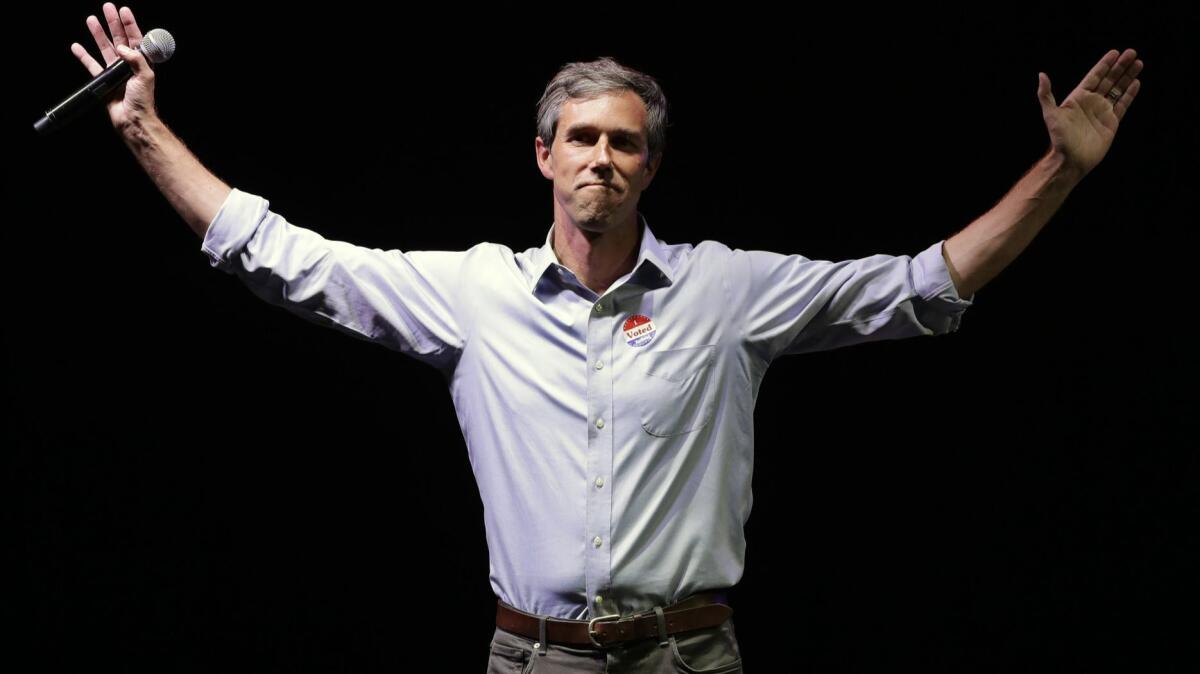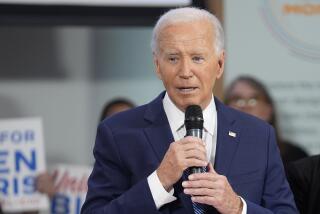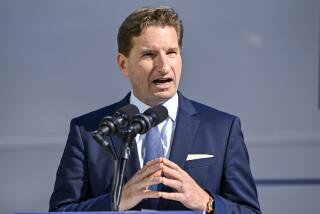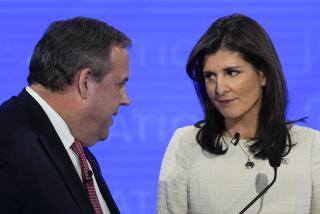He speaks to Democratic hearts. But is Beto O’Rourke a serious White House contender?

- Share via
He’s a failed U.S. Senate candidate with an undistinguished congressional record who, for the moment, is a blazing-hot 2020 presidential prospect — despite the fact that he may not run and faces long odds if he does.
Beto O’Rourke suggests the will-he-or-won’t-he speculation is something he himself can’t quite fathom.
“I think that’s a great question,” he responded in a Dallas Morning News interview when asked whether his unsuccessful November Senate bid merited a promotion to the White House. “I ask that question myself.”
And yet fascination has alighted on the 46-year-old El Paso congressman, who retires Jan. 3 after a scant three terms, reflecting an old Democratic habit — looking for someone to love — and an eagerness among many in the party for something entirely new following Hillary Clinton’s devastating defeat.
“What Democrats are saying is we want a real person who isn’t trying to balance every answer with a perfectly parsed sentence, [who] is genuine in letting their feelings be known and heard,” said Peter Hart, a veteran party strategist who is neutral in the party’s fledgling primary contest.
With the vast field of potential White House hopefuls still taking shape, the full measure of its contestants remains many months away. A burst of formal announcements, from California Sen. Kamala Harris, Vermont Sen. Bernie Sanders, Massachusetts Sen. Elizabeth Warren and assorted other Democrats, is expected early in the new year.
O’Rourke’s profile as a left-leaning Democrat from a conservative state and his considerable skill set — tremendous personal charisma, a mastery of social media, an astounding capacity to raise money — make him the closest thing so far to a breakout, if ambivalent, political star.
He raised a remarkable $80 million and built a national fan base with a campaign livestream that played like a fly-on-the-wall travelogue and broke new ground in the relationship between voter and candidate. (At a south Texas laundromat, O’Rourke responded to an online query — “boxers or briefs?” — by holding up a soggy pair of underwear that, as it turned out, was a combination.)
Perhaps more significant were the positions he staked.
He supported gun control and universal healthcare and football players kneeling during the national anthem to protest social injustice, positions that clearly weren’t aimed at finessing touchy issues or hugging the middle of the road.
“I laid out my vision for Texas and this country over the last two years without taking a single poll to find out where people were on the issues or how popular it was or how it would track in this community or that,” O’Rourke told reporters recently, after holding his final congressional town hall meeting in El Paso.
I ask that question myself.
— Democratic Rep. Beto O’Rourke, on whether his failed Texas Senate bid merits his elevation to the White House
For some liberals, O’Rourke’s record isn’t progressive enough. A relative moderate in the House, he failed, for instance, to sign onto legislation seeking to create a government-run healthcare system. But the combination of unscripted intimacy and unsanitized viewpoints suggest an authenticity that many others in the party are desperately craving.
Democrats have been known to think as much or more with their hearts than their heads, especially in the early stages of their presidential nominating process when just about anything, and any candidacy, seems plausible.
Unlike conservatives, who tend to view government as something onerous that needs to be constrained, many on the left see government as a force to be harnessed for good and want their president to embody that idealized vision. That hunger explains the perennial search for the next John F. Kennedy or, more recently, Barack Obama.
“It comes from a belief that, through politics, we can achieve a higher purpose,” said David Axelrod, who helped usher Obama, another political upstart with more electricity than experience, into the White House. “That belief requires someone who inspires confidence that this can be done and who summons us to those higher values.”
The yearning also helps explain the attraction — at least for some — of O’Rourke, who marries a toothy smile and gray-brown mop of hair, reminiscent of a Kennedy, with the long limbs and youthful brio of candidate Obama.
Axelrod sees similarities between Obama and O’Rourke, including their rocket-ship political rise and national following, and important differences, too, not least the question of whether the Texas congressman would have the broad appeal among African Americans, a key Democratic constituency, that Obama enjoyed as a history-making black candidate.
Regardless, Axelrod would like to see O’Rourke run. (The two have not discussed the race, though O’Rourke has spoken privately with Obama.)
“It’s not an open-and-shut case who’d be the best candidate for the Democratic Party,” Axelrod said, “but it’s good for the country and good for the party for the best potential candidates to get out on the field.”
What is far from clear is whether O’Rourke’s performance as a 2020 candidate, if it comes to that, can match the epic buildup.
“There’s a projection of hopes and dreams,” said Jim Henson, who had a front-row view of O’Rourke’s Senate run as a political scientist at the University of Texas in Austin. “He’s still perceived as something of a giant killer, even though he didn’t kill the giant.”
O’Rourke started his Senate bid as a tremendous long-shot. For some, the fact that he came as close as he did, losing to Republican Ted Cruz by a mere 3 percentage points, 51% to 48%, speaks of his great political promise. It was the strongest showing by a top-of-the-ticket Democrat in Texas in nearly three decades, though it’s unclear how much was his doing and how much resulted from a blue-wave backlash against President Trump.
O’Rourke has offered no firm date for making a decision on whether he’ll seek the White House or, as some Texas Democrats have urged, challenging the state’s other Republican senator, three-term incumbent John Cornyn, in 2020. (Members of O’Rourke’s skeletal political team did not respond to queries about his candidacy.)
“I’d love to take a backpack up into the Gila Wilderness,” O’Rourke told the Dallas Morning News, referring to a rugged expanse in southwest New Mexico, “and just spend some time thinking through stuff.”
Twitter: @markzbarabak
More to Read
Get the L.A. Times Politics newsletter
Deeply reported insights into legislation, politics and policy from Sacramento, Washington and beyond. In your inbox three times per week.
You may occasionally receive promotional content from the Los Angeles Times.










